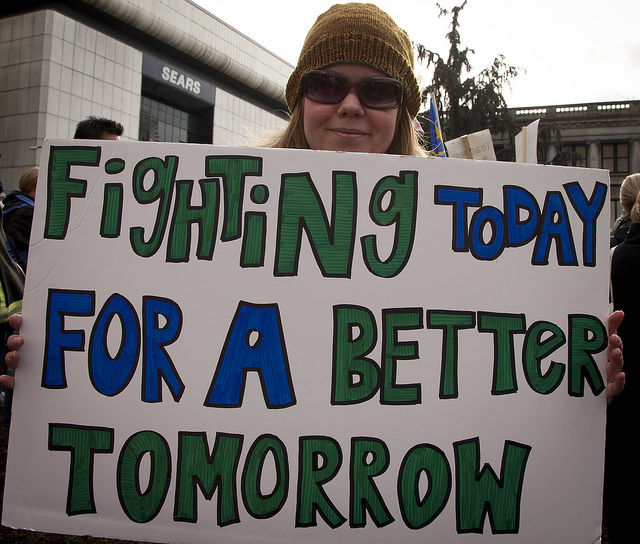Please support our coverage of democratic movements and become a monthly supporter of rabble.ca.
Warren (Smokey) Thomas gets angry when he hears the newly elected majority Liberal Ontario government being described as progressive.
The President of OPSEU (Ontario Public Service Employees Union) wants everyone to know there are no provisions in the proposed Liberal budget for increases in public service salaries over the next four years. This comes after salary freezes have been in effect for the last three years.
The no-money-for-public-workers Ontario budget introduced by the Kathleen Wynne Liberal minority government was rejected by the NDP, leading to the provincial election in which Wynne won her majority (helped by progressives, including some labour leaders). Thomas points out that privatization, and job cuts are part of what is planned.
The OPSEU President has bumped up against a big dirty secret: public servants are not supposed to benefit from economic growth. In Canadian economic policy, the unacknowledged assumption is that lower public service wages lead to economic prosperity.
In B.C., teachers are being accused by the Liberal government of being greedy, of wanting twice as much as other public sector workers. The teachers’ job action is primarily about working conditions and how they affect education — class sizes, and teacher pupil ratios, for example — matters which the B.C. Supreme Court has twice ruled the government must address. But the B.C. Liberals guess they can win the battle for public opinion by insinuating teachers mostly want a raise.
By standing against pay increases the government is counting the population will buy the idea that teachers are undeserving earners.
As Iglinka Ivanova of the CCPA shows, B.C. teachers pay has lagged inflation for two years, and is projected to lag economic growth for the next seven years under the B.C. government “offer” to the BCTF (British Columbia Teachers Federation). That doesn’t matter to the B.C. Liberals so long as they can claim what really matters to the BCTF is not children and their education, but teachers who want more.
Poor treatment of in the public sector follows the example of the private sector, where income for capitalists has been surging, and wages have been declining as a share of productivity increases.
The International Labour Organization (ILO) studies wages worldwide. Its Global Wage Report 2012-2013 showed that worldwide labour productivity was about double wage gains.
This evidence contradicts the standard explanation of how income is distributed, which claims that workers are paid according to what they contribute to productivity (and employers get to keep the rest).
For Canada, a study by Andrew Sharpe of the Canadian Centre for the Study of Living Standards found that while wages stagnated from 1980 to 2005, labour productivity increased by 37 per cent.
Growing profits are going to dividend payouts, more than to wage increases. The ILO data reveals wage gaps are created through unequal power relationships between employers and those selling labour. Financial globalization matters more than technological change or educational attainments when explaining why workers are paid less than what they produce.
In a much remarked upon, highly informative study of wealth and inequality (Capital in the 21st Century) Thomas Piketty describes how worldwide since the mid-1970s, the rate of return on assets (averaging four to five per cent) has outstripped economic growth (about 1.5 per cent).
In Canada, labour economists have been producing data showing wages stagnating, and the labour share of income dropping over the same period of increased wealth accumulation identified by Piketty. Capitalists are paying themselves a lot more than their workers.
Dating back to the 1980s, CUPE studies by John Calvert and his successor Toby Sanger, have shown how wages have consistently lagged economic growth. Both Andrew Jackson, and now Angela McEwan of the CLC have demonstrated how private and public wages have stagnated, though union members do make out better than non-union workers.
The CCPA Inequality Project has documented how the Canadian income gap is growing, partly as a result of poor wage growth. Anti-poverty activists and social economists point to the Canadian minimum wage as having peaked… in 1969.
It is reasonable for public workers to ask for a fair share of increases in public income. Stagnating wages causes the Canadian economy to underperform. By resisting further restrictions on wage growth OPSEU and the BCTF are trying to fix an economy that is not working for Canadians.
The quality of life is tied to how much people earn, not how much the stock market went up, or the price of gold increased. How long do people have to wait until the Ontario and B.C. governments recognize the need for public sector workers to be paid fairly?
Please support our coverage of democratic movements and become a monthly supporter of rabble.ca.
Duncan Cameron is the president of rabble.ca and writes a weekly column on politics and current affairs.
Photo: Flickr/Caelie_Frampton



